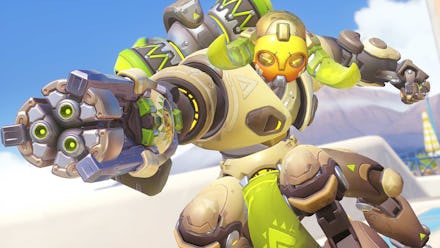'Overwatch' player claims it took "50 games" of toxic behavior before they were punished

Does reporting an Overwatch player for harassment actually do anything? One player wanted to find out for themselves, so they pushed the system to its limit — and the answer is yes. Kind of.
In order to test Overwatch's in-game system for dealing with abusive behavior, Reddit user TheOverwatchInt intentionally encouraged other players to report them en masse. They said it took "about 50 games" — meaning the total number of reports was likely much higher — for the reports to have any effect.
Their punishment? A chat ban of a few days, after which point they were free to rejoin chat once more as though nothing had happened. Strangely enough, TheOverwatchInt posted these results on /r/Overwatch and said they represented an indication that the system was working well.
"I am so happy that toxic players are dealt with," TheOverwatchInt wrote. "This is solid evidence that Blizzard [does] care about the community and [does] punish those who break the rules. Keep it up Blizzard, proud of you."
Is Overwatch's in-game reporting function effective?
Is that really the takeaway, though? Is a system that requires dozens of consecutive reports over the course of 50 games an effective way to curb everyday harassment, especially when it results in a chat ban of just a few days? Furthermore, is Blizzard's system working properly if the game's community has to ask whether reporting someone has any effect at all? My guess is no.
For the record, it doesn't sound like Blizzard is totally happy with its own system, either. In a May 26 post on the Overwatch forums, director Jeff Kaplan said Blizzard was "in the process of reviewing [its] punishment policies with an eye towards getting more aggressive on toxicity and throwing and other bad behaviors."
If Blizzard needs any ideas, it should consider taking a look at Valve's online multiplayer game, Dota 2. That game's reporting system actually lets you know whether a report you filed resulted in punishment. So, instead of forcing players to conduct extreme experiments to determine whether toxicity reports have an effect, Dota 2 gives you feedback and tells you how it handled a particular situation.
And, to prevent players from abusing this system, Dota 2 only allows you to file three reports per week, but those reports are refunded to you if a report you filed results in punishment. In other words, you're rewarded for reporting toxic individuals through being allowed to continue filing those reports. A system like this would probably help prevent a repeat of the "avoid this player" option that Overwatch players abused in order to prevent playing against skilled opponents.
Despite being out for a year, PS4 and Xbox One players still don't have any way to report players for racist, sexist or otherwise toxic behavior.
Of course, it's also worth noting that you can only report players in-game using the PC version of Overwatch. Despite being out for a year, PS4 and Xbox One players still don't have any way to report players for racist, sexist or otherwise toxic behavior. Kaplan said Blizzard has been working "super hard to make it happen," but that its implementation is "at the mercy of things beyond [Blizzard's] control."
Until Blizzard beefs up its reporting system, sexist tirades like the one Overwatch player Glisa endured for 16 minutes straight will continue to be all too common.
More Overwatch news and updates
For more on Overwatch, check out the rest of what Mic has to offer. Here is an essay about how Efi Oladele was a missed opportunity for Overwatch, a deep dive into the issue of sexual harassment in Overwatch voice chat, an unintentionally hilarious infographic showing the most popular Overwatch characters in each state, a criticism of Blizzard's failures in its design of Symmetra and a dive into a cool trend on Tumblr that converts your most-played heroes into a psychedelic illustration.